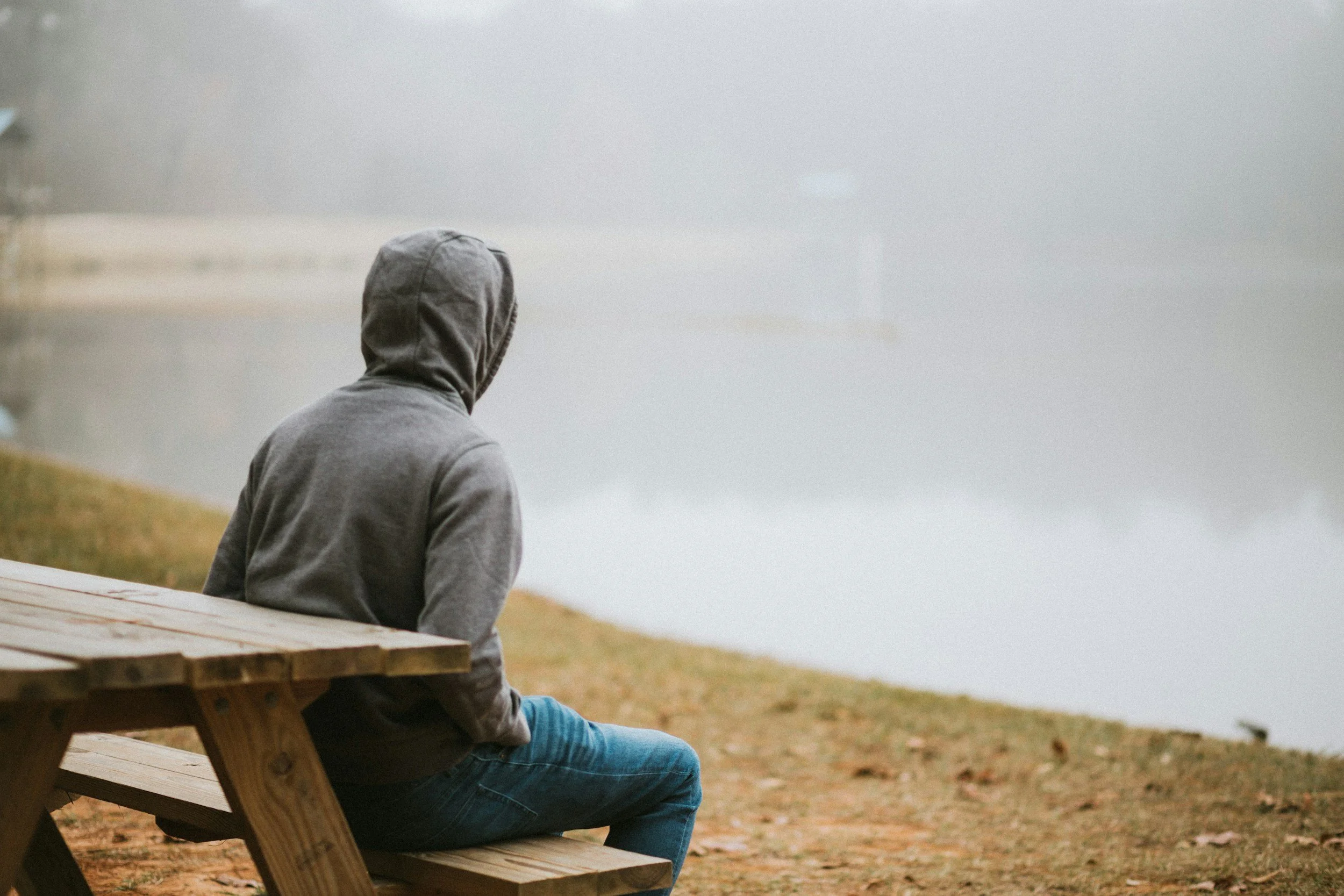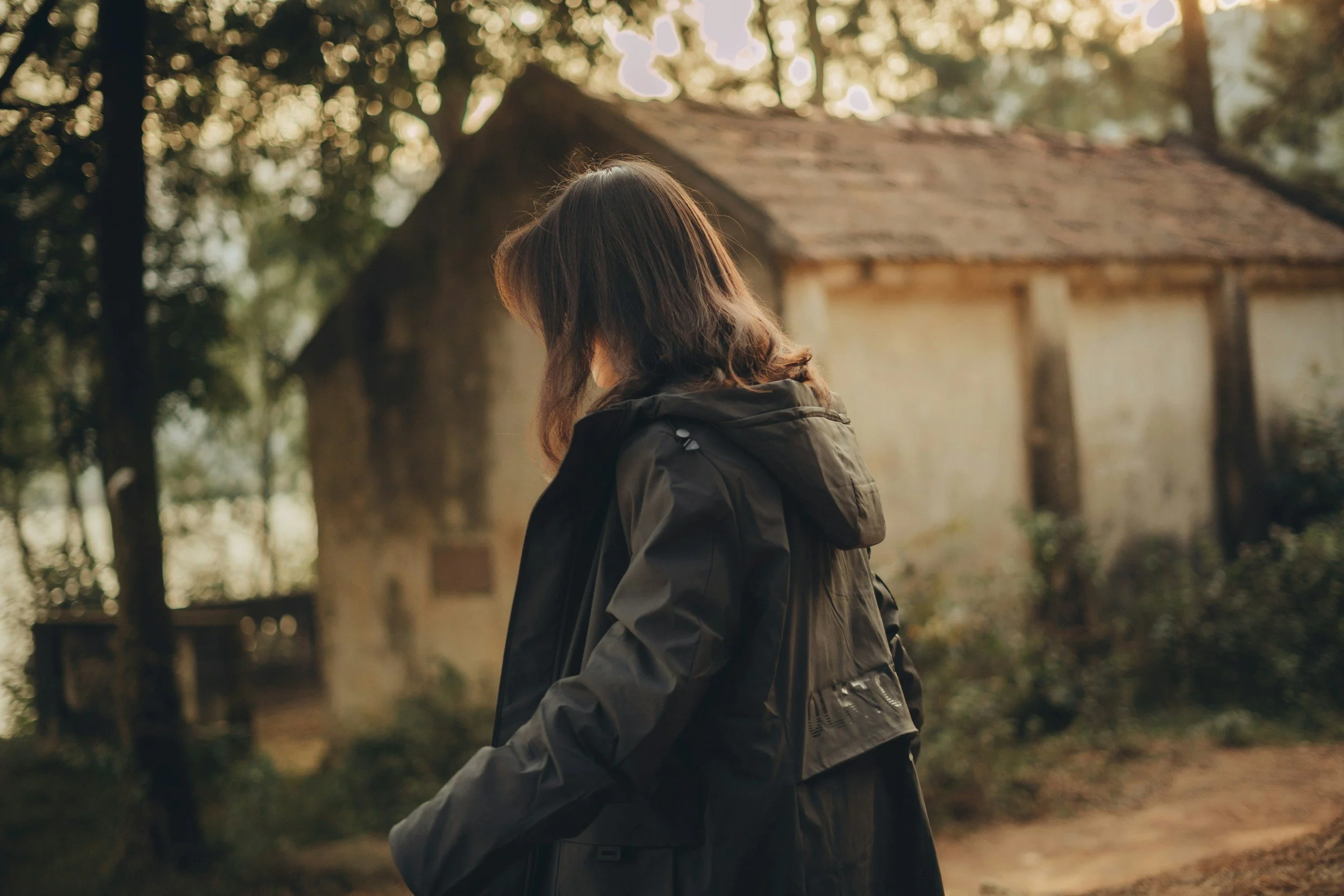How to Grieve When No One Will Talk About It (Or Wants to Hear About It)
Grief can make reading hard. Want to listen to this article instead? Find its corresponding podcast episode here.
Grief is hard to live with. But another layer of difficulty is added when others—whether friends or family—won’t talk about the loss.
Maybe they change the subject each time you bring it up.
Maybe they shame you by telling you you’re “too depressing” or you’re “living in the past.”
Maybe they grew up in a culture that doesn’t discuss death, dying, or feelings.
So many grieving people find themselves processing loss in isolation—not because they want to, but because no one around them will (or can) grieve with them.
If this is you, you're not broken, wrong, or "too much." You're grieving in a community that doesn't know how to witness grief.
Let’s talk about why that happens—and what to do when you're forced to carry your grief alone.
Why Don’t People Want to Talk About Loss?
There are many reasons why people shut down or change the subject when grief comes up. And none of them have to do with your value—or the value of your person(s) who died.
1. Cultural Practices Around Death
For some, speaking of the dead is considered bad luck, disrespectful, or even dangerous. Susan Lieu, author of The Manicurist’s Daughter, shared on an episode of Grief Grower: “My mom died from a botched tummy tuck when I was 11. And to this day, my family has never spoken about our mother or what happened.”
In Susan’s Vietnamese-Chinese family, talking about the dead was taboo, so grief became something she was expected to carry quietly and alone. She said: “Whenever I asked anything, the response was, ‘You're living in the past.’ ‘You're so emotional.’ ‘What's wrong with you?’ ‘Why are you such a downer?’”
Her parents and grandparents had lived through wars, poverty, becoming refugees, becoming orphaned, and immigrating to the United States where they had few connections and did not speak English. In the face of their shared traumas and tragedies, Susan was made to feel like her mother’s death wasn’t so bad compared to what they’d endured. To them, the loss of one parent in an otherwise “comfortable” life was not true suffering—and it was not customary to talk about the dead anyway. This made for a real double-whammy of grief for young Susan.
2. They Don’t Know What to Say
Death and grief make people uncomfortable—especially in societies like the United States like that value productivity, happiness, certainty, and “bouncing back.” If your loss doesn’t come with tidy answers or clear circumstances, many people simply back away, abiding by the belief, “If you can’t say something helpful or comforting, it’s better to say nothing at all.”
Many people mourning someone’s death face this, but others’ silence is often amplified around secretive, complicated, or highly publicized losses. They may be quiet because of how someone died—suicide, homicide, overdose, accident, and so on. They may also be quiet because of your own or their relationship to the person; for instance, if they were estranged.
Sadly, our society does not have structures or systems in place that educate us en masse on how to comfort someone who’s grieving. That is still done on an individual level. So if your loss does not fall under the reasons listed above, you may just be surrounded by people who haven’t been taught what to say to someone after a devastating loss. In other words, you might have a very large friend and family circle who genuinely want to help—but they simply don’t have the tools to do so. (If this sounds like you, please send them the link to my book, Of Course I’m Here Right Now.)
3. They Think You Should Be “Over It”
Grief doesn’t follow a timeline, but the world around you often does. If your person died a while ago, or if you're still struggling months or years later, you may be met with side-eyes, silence, or outright dismissal.
One student in Life After Loss Academy recounted how her church community fell silent after her trans daughter’s death by suicide. She was, understandably, shaken by the loss and continued to bring her pain to church groups and prayer circles. But after a while, they told her that her emotions were “too much” and stopped acknowledging her loss altogether. This was a devastating blow to her grieving heart, which just wanted the death of her daughter to be noticed and remembered, especially during significant tasks (like going through her daughter’s belongings) and important grief days (like her daughter’s birthday).
4. There’s No One Left Who Remembers
Some grievers are, metaphorically or literally, the last one standing. When everyone else who knew your person has died, disappeared, or doesn't speak to you anymore, you may feel like there's no one in your orbit who can remember them with you. All of your support, if there’s any to be found, is secondhand, where you are responsible for telling others about your person because they didn’t get to know them in life.
A lot of people assume this happens most often to seniors, who gradually attend more funerals as they get older—and this is a big part of our societal “no one left to remember” grief. But this type of silence can also be present for immigrants who don’t speak the language of a country they fled or moved to, or survivors of mass violence, epidemics, or natural disasters.
In the United States in the 1980s and 1990s, many LGBTQ+ folks recount watching all of their friends and loved ones die as a result of the AIDS crisis. Before government acknowledgement of the virus and prior to medical interventions like PrEP, queer people died in astonishing numbers, leaving their surviving friends or family members to be the sole bearers of their memories. They experienced a kind of disenfranchised grief where they largely mourned their losses in silence. In more recent, worldwide news, a new acronym, WCNSF, which stands for “Wounded Child, No Surviving Family” was created in the wake of the genocide in Gaza. These children, whose entire families died and who have no surviving family, will carry the firsthand memories of their deceased loved ones by themselves.
5. Support Isn’t Always Accessible
Therapy and grief groups can be life-changing—but they can also be expensive, location-dependent, or not culturally affirming. And when you’re already feeling overwhelmed by loss, finding help can feel like another heavy task you don’t have energy for.
Quite a few grieving people I’ve heard from—especially those who are caregivers or who work multiple jobs—say things like, “I literally don’t have time to grieve.” Simply put, beyond a paltry three-day bereavement leave from work, our society doesn’t offer many supports that help us emotionally cope with the losses we’ve faced. For a majority of us, the tasks of finding time, space, energy, and community to grieve are on our plates.
How to Process Grief When You Have to Do It Alone
If no one will grieve with you, you’re not out of options. There are ways to move with and through your grief—even when you’re the only one willing to be present with it.
Here are some powerful, solo grief practices that are accessible, low-cost, and incredibly validating:
1. Journal Honestly and Often
Write letters to your person. Vent. Scream on the page. Ask questions no one else will answer. Let your grief be messy, weird, nonlinear, and deeply true.
You can journal with a physical pen and paper, but if that’s too much for your grief brain to keep up with right now (I’ve been there!) the Voice Memo app on your phone can be useful, as well as the Notes app. There are also dozens of free and paid apps that help you keep a private journal on your phone, computer, or tablet, so you always have it with you.
2. Create Something Inspired by Your Loss
In our conversation on Grief Grower, Susan shared how turning her grief into art by way of theater, book-writing, and comedy saved her: “For me to express it, it was able to transform and dislodge from being very stagnant energy in my brain and body.”
Whether it's writing, painting, dancing, woodworking, or cooking—making something from your grief gives it shape. It gives it movement. It gives it somewhere to go.
And remember, your creation doesn’t need to be consumable to the masses. It’s okay to make something just for you. There is a sacredness in working inside of your own private studio, theater, kitchen, or shed. Put on a grief performance in your living room where you are the art and the audience all at once. Or turn your dining table into a grief restaurant for one.
3. Explore Your Person’s History
If your family or friend group won’t talk about the person who died, go looking anyway—in accessible, publicly available spaces. Search online archives, ancestry tools, or local records for articles or stories that include them. Libraries are especially helpful for projects like this.
Susan researched the doctor and medical team that killed her mother, her family’s refugee history, and her own childhood in order to better understand where her grief came from—and where it wanted to go. You can hear more about it in our conversation.
4. Visit Meaningful Places
Return to places you shared with your person. Or explore places they never got to go. Grief lives in the body, and physical movement through memory-rich locations can unlock stuck stories and emotions.
I remember my best friend who died from COVID by running on Chicago’s lakefront. She was a two-time marathoner and running by the water always activates memories of her that are under the surface most days. I commemorated my mom who died from breast cancer by visiting the Redwood Forest, a place she always wanted to go but didn’t get a chance to before her death. While visiting, I asked a lot of questions about what she would think of the scenery, the birds, the drive, and my pit stops for meals.
There are a decent amount of articles about the phenomenon of “grief vacations,” or travel with the express purpose of processing grief. Perhaps this is something you might like to do.
5. Consume Grief-Inclusive Media
Watch griefy shows. Listen to griefy podcasts. Read griefy books and articles. (You’re doing that one right now!)
Some of my favorites include:
Grief Out Loud (Podcast)
Terrible, Thanks for Asking (Podcast)
As Long As You Need (Book)
The Manicurist’s Daughter (Book)
A Heart That Works (Book)
Modern Loss (Blog)
What’s Your Grief (Blog)
The Golden Girls (TV Series)
Shrinking (TV Series)
This Is Us (TV Series)
Steel Magnolias (Movie)
Meet Me Where I Am (Movie)
Speaking Grief (Movie)
Searching for “grief movies” or “grief podcasts” online can help you discover new media about loss. You might also connect with fellow fans who were drawn to it because of its griefy themes.
6. Create Personal Rituals
Small, ongoing practices can help you feel connected to your person—and while that’s not the same as talking to a living person about your grief, it can help you feel connected and less alone.
Light a candle every Monday. Cook their favorite meal on the 18th of each month. Talk to their photo when you wake up. Rituals don’t have to be big—or even daily—to be significant. They just have to matter to you.
If You’re Craving Community, You Deserve It
Some grievers want to grieve alone for a season, and that’s perfectly okay—but if you want people to talk to, share with, and feel seen by, you deserve that. And there are places to find grief-inclusive community that won’t break the bank.
Here are a few ways to connect:
Life After Loss Academy
A supportive, inclusive grief course + community where you can:
Join weekly live grief coaching calls (replays available immediately)
Learn tools to stay grounded in an uncertain world
Connect with others who actually get it
Build a life that includes your grief—and your future
Hospices, Hospitals, and Funeral Homes
Many offer free or low-cost grief support groups—whether or not you use their services.
Just search: “grief support near me” or “hospice grief group [your city]” on any online search engine. Or call any local hospital, hospice, or funeral home to see what support groups and organizations they recommend.
Libraries, Community Centers, and Religious Organizations
Many offer open grief groups, meditations, or creative processing spaces on a sliding scale or donation basis.
Closing Thoughts: Grief Is Personal—But You Shouldn’t Have to Go It Alone
No one should have to grieve alone. But if you’ve been doing it by yourself—because your culture, your people, your history, or your finances gave you no other option—I want to say this clearly: Your grief is valid. And your need for connection is human.
Some parts of grief are things we can only process or carry alone. But many parts soften and heal when carried together.
There is nothing weak, shameful, or needy about wanting someone to talk with about your loss. There is nothing wrong with needing to speak your person’s name out loud in the presence of caring others who honor your grief.
And when you’re ready—there are communities out there who will welcome you with open arms.


